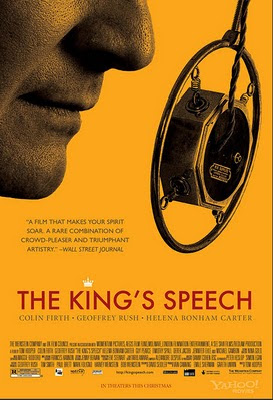The King’s Speech (***½)
Directed by: Tom Hooper
Starring: Colin Firth, Geoffrey Rush, Helena Bonham Carter, Guy Pearce,
Michael Gambon, Timothy Spall, Derek Jacobi
Seen: February 18th 2011
***½ Out of ****
Prince Albert, Duke of York (Firth), stammers so violently that he
breaks out in a cold sweat at the thought of speaking to large crowds (or any
size crowd, for that matter). Albert’s father, King George V (Gambon), among
many others, keeps giving Albert the apparently wise but completely useless
advice of letting the microphone do the work for him, but on various occasions
Albert feels ridiculed by those in his audience. With his wife Elizabeth (Bonham
Carter), he has ineffectively sought help in so many places that he has given
up on finding effective treatment, but Elizabeth does seek out one last
candidate; Lionel Logue (Rush). He is unconventional to say the least, and even
when he hears that he is to treat not the anonymous Mr. Johnson, but the Duke
of York, he refuses to come to their residence for the sessions, rather
insisting that Prince Albert be brought to his dilapidated home where he lives
with his wife and two sons.
The first session gives Lionel enough to realise the nature of Albert’s
problem, and he finds a way past Albert’s stubborn defences on a rocky road towards
betterment. Albert’s brother Edward, Prince of Wales (Pearce), is next in line
to become King, and he does move into the role as King Edward VIII. The problem
is however that he is also somewhat of a philanderer, seemingly only engaging in
relations with married women, and Edward eventually gives up his firstborn
right as King to marry the woman he loves, which causes quite a stir in the
United Kingdom. This paves the road for Albert to become King George VI, carrying
with it an increased responsibility for public speaking.
Logue, through his slightly irreverent ways, manages to eventually get
close to Albert, even calling him by a nickname preserved for only his family, to
Albert’s initial chagrin. The two become friends, and it is through this
friendship that King George VI is eventually able to deal with this fear of
public speaking of his in a wonderfully climactic sequence of events as the
United Kingdom declares war on Hitler’s Germany and he has to address the
nation through this movie’s villain, the microphone.
The King’s Speech is a great movie that understands the fact that
while War, Germany, Hitler are the historically significant villains, the aim
of this story makes use of an inner conflict as villain. Through this
realisation the movie is, I believe, far superior to anything it might have
been had this not been the case. Colin Firth is majestic in his portrayal of
the scared but courageous monarch, and he thoroughly deserves every accolade
headed his way. Geoffrey Rush himself also brings to life a grand character in
Logue, and his calm enjoyment of the material shines through. His stammering
yet powerful King George VI takes up place in every viewer’s heart, and if you
don’t feel a triumphant belly laugh rising up from the depths of your soul as
the movie reaches its apex I have bad news for you, you might be dead.
The humour in the movie originates from the characters, and not from
cheap one-liners, something that makes things feel all the more heartfelt (at
one stage Albert’s daughter asks him what Hitler is saying, to which he
responds: “I have no idea, but he seems to be saying it very well”). The King’s
Speech is a great movie, and I can freely recommend it to anyone with a heart, you’ll
not be disappointed.



Comments